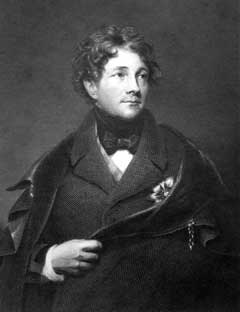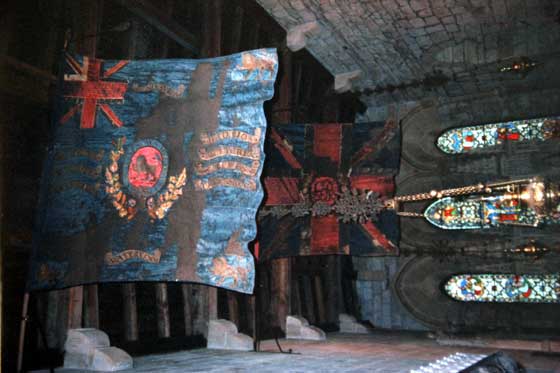Regimental History
Colonels of the King's Own Royal Regiment
General Sir Thomas Bradford GCB GCH
Son of Sir Thomas Bradford of Ashdown, Sussex.
Ensign 1793. Served in Ireland during the Rebellion of 1798. Assistant
Adjutant General in Hanover under Lord Cathcart, 1805. Present at the
Attack and Siege of Montevideo and Buenos Ayres. Assistant Adjutant
General in the Army of Portugal 1808, present at Vimiera and Corunna.
Commanded a Brigade of the Portuguese Army 1811-1814 and took part in
most of the actions of the Peninsula Campaign. General 23 November 1841.
GCB GCH. Colonel of the King’s Own 7 February 1846. Died at Eaton
Square, London, 1853.

General Sir Thomas Bradford, Colonel of the Regiment.
Accession Number: KO2590/380

4th Foot. Presented by the Earl of Chatham at
Glasgow on 27th September 1828. Passed to Sir Thomas Bradford in 1846
and deposited in Hartburn Parish Church, Northumberland, where they
still hang.
Accession Number: KO1803/12
Sir Thomas Bradford has a connection with St. Andrew’s Parish
Church, Hartburn, near Morpeth, Northumberland, visited on 18 Jul 1993,
by Norman Rowlinson, museum volunteer, who produced the following notes:
Engraving/lithograph of bust of General Sir Thomas Bradford with the
following inscription:
General Sir Thomas Bradford GCB GCH
Colonel of the 4th Regiment of Foot was in Command of Bradford’s Brigade
in the Peninsula War, and was afterwards successively commander of the
forces in Scotland, and Commander of the Army in the Bombay Presidency.
Signed T (?) Bradford.
On the bottom of the frame is a label bearing the following:
The flags of the 30th Regiment (Cambridgeshire) Foot and the 4th King’s
Own (Lancastrian) Regiment were given by General Bradford. The Chantry
Memorial was to his wife.
Brass on north wall of the church:
In Memory of General Sir Thomas Bradford GCB GCH Colonel of the 4th
Regiment of Foot who was engaged in most of the battles and sieges
during the wars in South America, Portugal, Spain and France from 1806
to 1815 and was severely wounded at Bayonne. He died 28 November 1853.
His remains lie in the vault beneath.
Part of inscription on the Chantry Memorial reads:
Sacred to the memory of Mary Ann, Wife of Lieutenant General Sir Thomas
Bradford GCH & KCB. Who died at sea on their passage homewards from
India on 14th February 1830 and was buried in the Vault beneath on the
16th May following.
Nearby the inscription on another brass relates to the bequest by the
uncle of Lady Bradford of the Angerton Estates to the Bradford’s
children in 1827.
Hanging approximately above the foregoing are two ‘Colours’, one
unidentified and the other being the Regimental Colour of the King’s Own
Regiment which bears the Battle Honours: Peninsula, Corunna, Badajoz,
Salamanca, Vittoria, St. Sebastian, Nive, Bladensburg, and Waterloo.
A third Colour to the 30th Regiment of Foot hangs opposite on the south
side of the Chancel.
The three-panel East Window of the Church has the following inscription
on two brass stripes beneath:
To the Memory of General Sir Thomas Bradford GCB died 28 Nov 1853, aged
76. These windows dedicated by his widow and children.
Brass on the North Wall of the Chancel:
In memory of Colonel Sir Henry Bradford
Colonel of the 1st Regiment of Guards who was engaged in most of the
battles and Sieges during the wars in Portugal, Spain, France and the
Netherlands from 1807 to 1815 and died from the effects of a wound
received at the Battle of Waterloo. 17 Dec 1816 Aged 33 Years. His
remains life in Storrington Churchyards, Sussex.
Only a proportion of our collections
are on display at anyone time. Certain items are on loan for display
in other institutions. An appointment is required to consult any of
our collections which are held in store.



